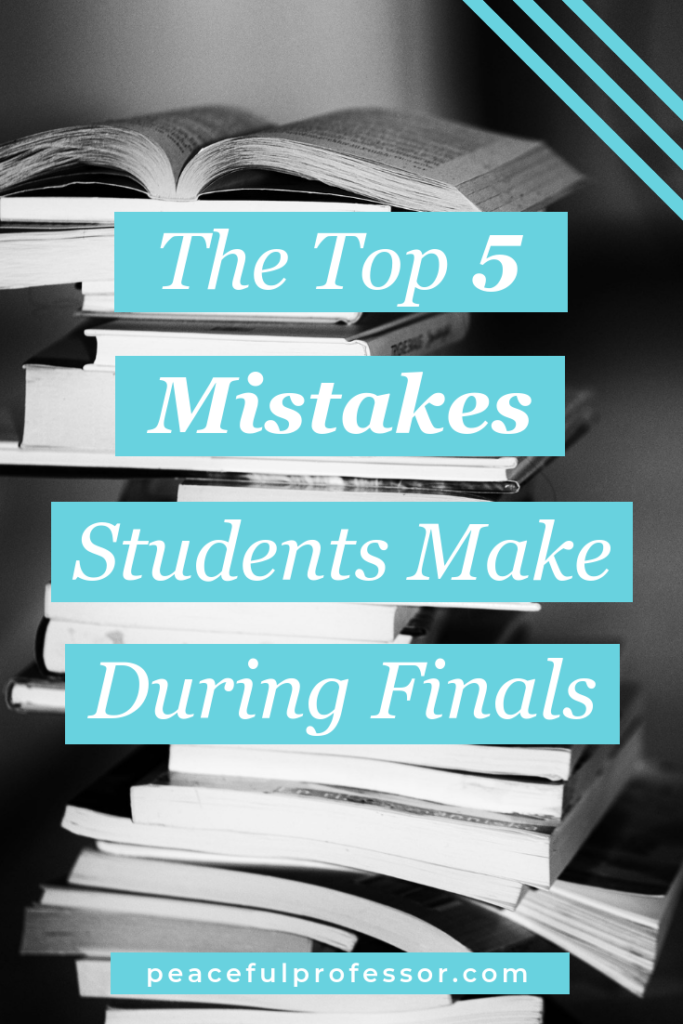Top 5 Mistakes College Students Make During Finals Week
There’s no more stressful, panic-inducing time for college students than finals week. During this time, students are often seen dragging themselves across campus, double-fisting energy drinks and spontaneously sobbing (Seriously. Some universities have created “cry closets” for students!).
But finals week doesn’t have to be the worst time of the year! It’s absolutely possible to do well on your final exams and keep your stress in check by avoiding these five common mistakes.
First, let me emphasize that stress is not necessarily an enemy. Rather, it’s a normal part of life and it serves to both protect us and motivate us. When we experience a small spike in stress, it can push us to do our best. But when we experience chronic stress, it can paralyze us.
Stress is like the check engine light that pops up on your car dashboard warning you that maintenance is needed. Rather than continuing to drive around thinking “eh, it’ll be okay,” you need to pull over and reassess your study habits, starting with these five:
Not having a plan
One of the biggest mistakes students make is not creating a study plan in advance. Make your study schedule now! Organize your notes. Meet with professors to ask questions and get help. Schedule appointments for tutoring. Don’t wait until finals week to do this.
To make your plan, review syllabi, class notes, and the university exam schedule, then work backwards to determine how much time you’ll need to devote to each course. Add those time slots to your planner or calendar. If you start early enough, you’ll be able to schedule study time in manageable chunks that will reduce stress and help you process the material more effectively.
This is known as “spaced practice” and involves dividing studying into installments, allowing time to elapse in between. One of the best ways to employ this technique is to study your notes and quiz yourself each week (not after every class or waiting until finals week).
Research indicates that allowing yourself a little time to “forget” is a good thing because it then requires extra effort to retrieve the piece of information from memory. Each time we recall information, we strengthen the neural pathways that move the information from our long-term memories to our working memories. This is key. The more times we retrieve the information, the better. But the only way you’ll be able to implement spaced practice is by starting early and making a plan!
Rereading your notes
The typical advice given to students is focused repetition, reflecting the belief that if we expose ourselves to something enough, we can burn it into memory. This is called “massed practice” by cognitive scientists and “cramming” by students. Given how frequently this advice is offered, it should come as no surprise that college students’ most commonly reported study habits are to re-read their textbook and “go over” their notes. Unfortunately, these are some of the least-effective ways to learn.
A more effective strategy is to employ practice testing or what scholars call “active recall.” This involves actively stimulating your memory by quizzing yourself. Each time we recall information from our long-term memory, we are strengthening neural pathways and strong pathways mean you are more likely to remember the information during your exam. Try the Leitner flashcard system, ask a friend to quiz you, and take numerous practice quizzes that your professor provides, you create, or you find on sites like Quizlet.
Unfortunately, despite its effectiveness, self-quizzing is often disliked by students because it requires more effort than simply rereading the textbook or copying notes over and over. But remember: the greater the effort, the deeper the learning.
Pulling all-nighters
Many people think all-nighters are a collegiate rite of passage. What they really are is a recipe for disaster. As I mentioned, the best way to learn is through spaced practice and effortful retrieval. You can’t do this in a few hours or when you’re mentally overwhelmed and physically exhausted.
Furthermore, a growing body of research in neuroscience is demonstrating how important sleep is to learning and memory. It’s during sleep that your brain organizes and prioritizes information you learned during the day. According to Dr. Matthew Walker, a sleep researcher at the University of California, Berkeley, sleep after learning is essential to save new information into the architecture of the brain. So think twice before pulling an all-nighter: If you don’t sleep, your ability to learn new information could drop by up to 40 percent!

Relying on flashcards
In addition to rereading notes, using flashcards is one of the most commonly reported study strategies. Flashcards can be an excellent tool for self-quizzing, but many students don’t use them effectively. For example, students will make flashcards for every piece of content that could possibly show up on an exam even if they already know some of it. If you already understand it, don’t waste precious time making a flashcard for it!
A more efficient way to use flashcards is to review them at increasing intervals. As you become more confident about the content on a particular card, you can wait longer before you review that card again.
For example, let’s say you’re quizzing yourself and you’ve correctly recalled the information on a card three times in a row. You don’t need to keep reviewing it in that same study session. Instead, set it aside in a separate “to review” pile and return to it later (preferably after several days. Remember the importance of spaced practice!). When you review that card later, if you still recall it, you can wait even longer before looking at it again. If you forget the content, return it to the “to study” pile of cards. Also, make sure you’re shuffling your flashcards each time you review them, rather than always keeping them in the same order.
Finally, don’t rely on flashcards as your only study strategy. It’s important to employ multiple methods, known as “varied practice.” Neuroimaging studies suggest that different types of practice engage different parts of the brain. By using a variety of techniques, you are broadening your understanding of the concepts and the relationships between them, which strengthens those all-important neural pathways.
Trying to do it alone
Studying for exams can feel very isolating. But participating in finals week events on campus can help you feel less alone and less stressed (misery loves company, right?). Students at Illinois State University shake off their stress with a huge dance party known as Club Milner. At Carleton College in Minnesota, the night before exams start, students collectively engage in a “primal scream.” At Longwood University in Virginia, faculty and staff serve pancakes to students at Late Night Breakfast while College of Charleston students in South Carolina snuggle with puppies.
Taking advantage of campus resources also includes help your individual professors may offer such as exam review sessions, study guides, and extra office hours. And don’t forget about your campus counseling center! They often increase their hours during exam week and offer services like peer counseling and support via text messaging. These folks understand what it’s like to be a student and can help you build a toolkit of skills to take care of your mental health.
Finally, please remember that although you are a college student, you are more than your grades. Your mental and physical health are far more important than what you earn on your exams. Please make time for self-care and seek support if you’re feeling overwhelmed. Go for a walk with a friend; take a nap; write out your worries; drink more water. You got this!
